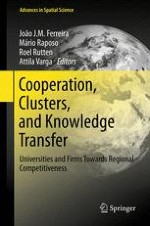2013 | OriginalPaper | Buchkapitel
12. Hirschman Mobility, Governance and Loyalty in Europe’s Top Research Universities
verfasst von : Edward M. Bergman
Erschienen in: Cooperation, Clusters, and Knowledge Transfer
Verlag: Springer Berlin Heidelberg
Aktivieren Sie unsere intelligente Suche, um passende Fachinhalte oder Patente zu finden.
Wählen Sie Textabschnitte aus um mit Künstlicher Intelligenz passenden Patente zu finden. powered by
Markieren Sie Textabschnitte, um KI-gestützt weitere passende Inhalte zu finden. powered by
